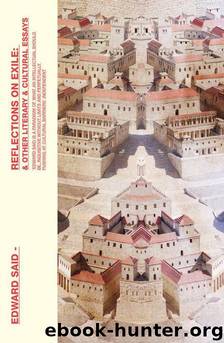Reflections on Exile and Other Essays by Edward W. Said

Author:Edward W. Said [Edward W. Said]
Language: eng
Format: epub
Publisher: Granta Books
Published: 2013-07-19T06:00:00+00:00
27
Representing the Colonized:
Anthropology’s Interlocutors
pas un bout de ce monde qui ne porte mon empreinte digitale et mon calcanéum sur le dos des gratte-ciel et ma crasse dans le scintillement des gemmes!
—AIMÉ CÉSAIRE, Cahier d’un retour au pays natal
Each of the four main words in the title of these remarks inhabits a rather agitated and somewhat turbulent field. It is now almost impossible, for example, to remember a time when people were not talking about a crisis in representation. And the more the crisis is analyzed and discussed, the earlier its origins seem to be. Michel Foucault’s argument has put somewhat more forcefully and more attractively perhaps a notion found in the works of literary historians like Earl Wasserman, Erich Auerbach, and M. H. Abrams that with the erosion of the classical consensus, words no longer comprised a transparent medium through which Being shone. Instead, language as an opaque and yet strangely abstract, ungraspable essence was to emerge as an object for philological attention, thereafter to neutralize and inhibit any attempt at representing reality mimetically. In the age of Nietzsche, Marx, and Freud, representation has thus had to contend not only with the consciousness of linguistic forms and conventions, but also with the pressures of such transpersonal, transhuman, and transcultural forces as class, the unconscious, gender, race, and structure. What transformations these have wrought in our notions of formerly stable things such as authors, texts, and objects are, quite literally, unprintable, and certainly unpronounceable. To represent someone or even something has now become an endeavor as complex and as problematic as an asymptote, with consequences for certainty and decidability as fraught with difficulties as can be imagined.
The notion of the colonized, to speak now about the second of my four terms, presents its own brand of volatility. Before World War II the colonized were the inhabitants of the non-Western and non-European world that had been controlled and often settled forcibly by Europeans. Accordingly, therefore, Albert Memmi’s book situated both the colonizer and the colonized in a special world, with its own laws and situations, just as in The Wretched of the Earth Frantz Fanon spoke of the colonial city as divided into two separate halves, communicating with each other by a logic of violence and counterviolence.1 By the time Alfred Sauvy’s ideas about Three Worlds had been institutionalized in theory and praxis, the colonized had become synonymous with the Third World.2
There was, however, a continuing colonial presence of Western powers in various parts of Africa and Asia, many of whose territories had largely attained independence in the period around World War II. Thus “the colonized” was not a historical group that had won national sovereignty and was therefore disbanded, but a category that included the inhabitants of newly independent states as well as subject peoples in adjacent territories still settled by Europeans. Racism remained an important force with murderous effects in ugly colonial wars and rigidly unyielding polities. The experience of being colonized therefore signified a great deal to regions and
Download
This site does not store any files on its server. We only index and link to content provided by other sites. Please contact the content providers to delete copyright contents if any and email us, we'll remove relevant links or contents immediately.
The Secret History by Donna Tartt(19092)
The Social Justice Warrior Handbook by Lisa De Pasquale(12191)
Thirteen Reasons Why by Jay Asher(8912)
This Is How You Lose Her by Junot Diaz(6889)
Weapons of Math Destruction by Cathy O'Neil(6281)
Zero to One by Peter Thiel(5802)
Beartown by Fredrik Backman(5756)
The Myth of the Strong Leader by Archie Brown(5509)
The Fire Next Time by James Baldwin(5447)
How Democracies Die by Steven Levitsky & Daniel Ziblatt(5219)
Promise Me, Dad by Joe Biden(5154)
Stone's Rules by Roger Stone(5088)
A Higher Loyalty: Truth, Lies, and Leadership by James Comey(4964)
100 Deadly Skills by Clint Emerson(4926)
Rise and Kill First by Ronen Bergman(4790)
Secrecy World by Jake Bernstein(4753)
The David Icke Guide to the Global Conspiracy (and how to end it) by David Icke(4720)
The Farm by Tom Rob Smith(4514)
The Doomsday Machine by Daniel Ellsberg(4490)
